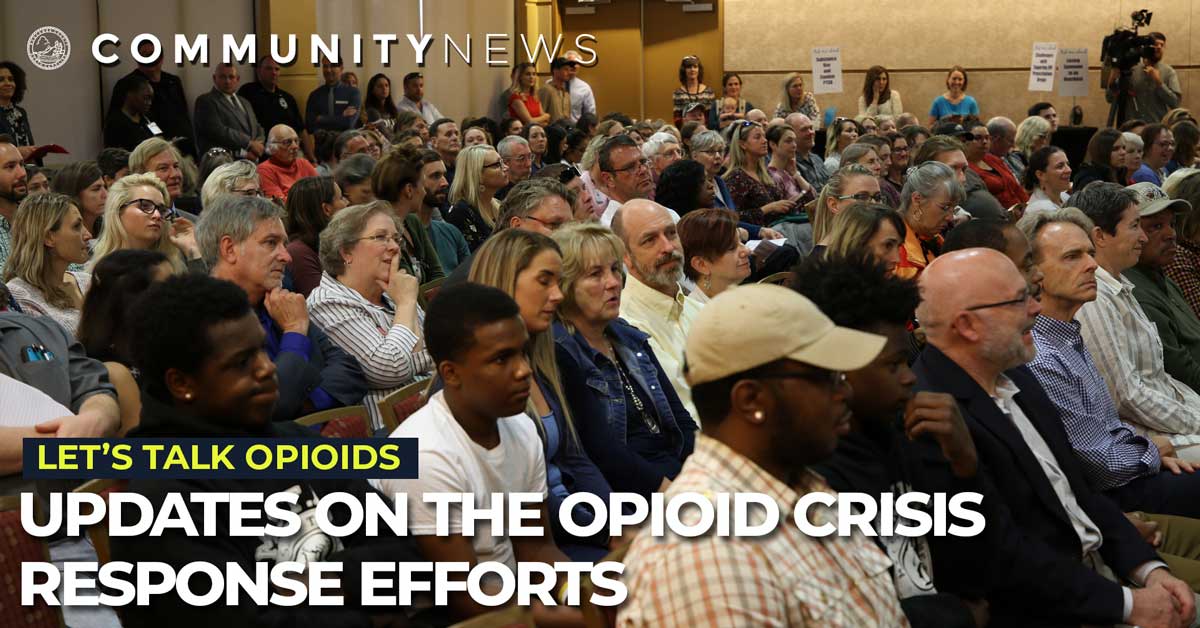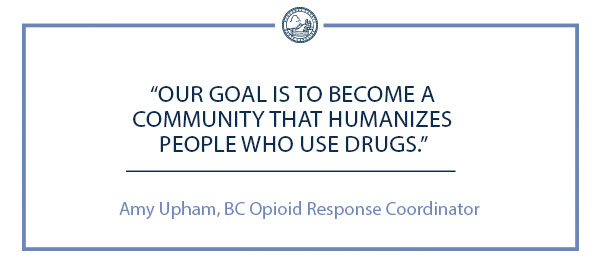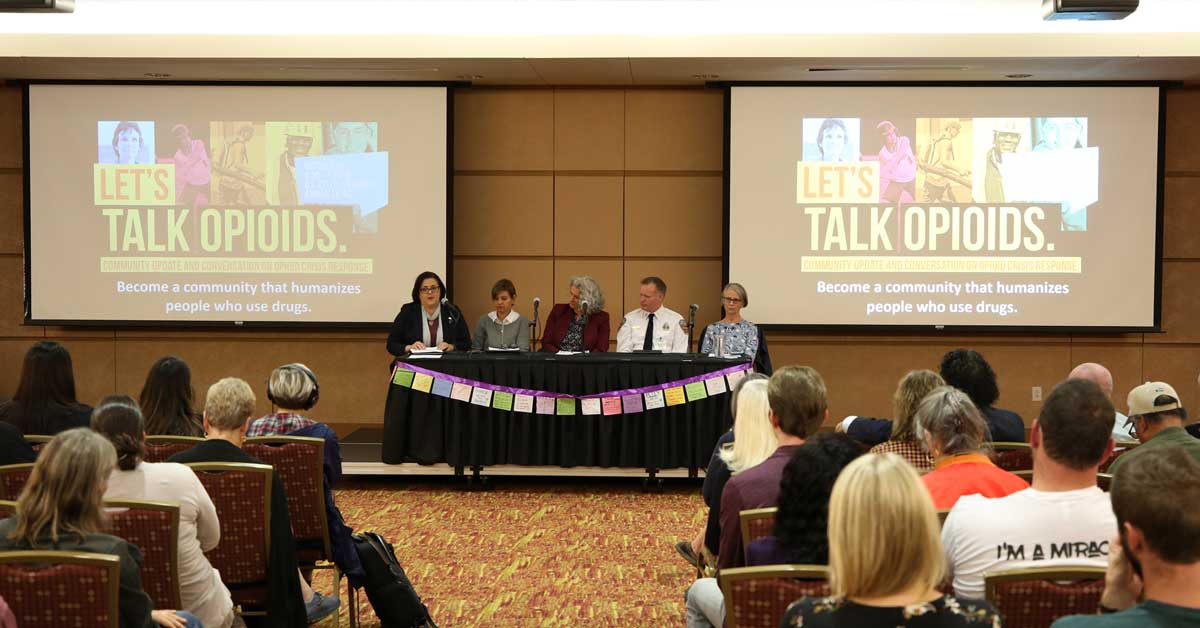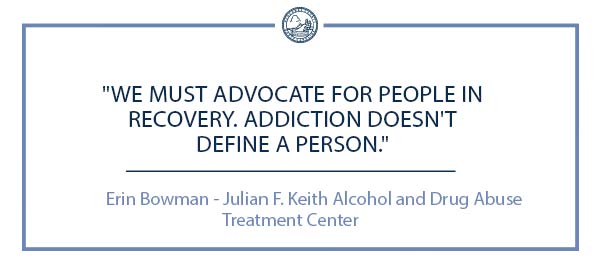This news item expired on Sunday, November 1, 2020 so the information below could be outdated or incorrect.

Opioid crisis response efforts were on the minds of hundreds of community members at the recent "Let's Talk Opioids" event at the U.S. Cellular Center. Locally, community leaders, professionals, and service providers are coming together to tackle the complicated issue of opioid misuse and overdose death. Buncombe County Government, City of Asheville, VAYA Health, and MAHEC collaborated to provide updates on local data trends affecting our community and related efforts aimed at improving health and safety. Guests were greeted by over 20 community organizations that hosted tables and answered questions about their services.
The evening opened with remarks from Vice Chair, District 1 Commissioner, Jasmine Beach-Ferrara and the Mayor of Asheville, Esther Manheimer. Buncombe County Opioid Response Coordinator, Amy Upham, and UNC Health Sciences at MAHEC's Chief Education Officer, Dr. Blake Fagan, gave an update on the state of the opioid crisis in Buncombe County and offered statistics around this complex issue that were both encouraging and troubling.

According to data from the N.C. Injury and Violence Prevention Branch, in 2016, 66.5 pills were dispensed per resident in Buncombe County. This number has since dropped to 43 pills per resident in 2018. Upham added that based on new data gathered through a historical mapping project, we have seen a 30 percent decrease in opioid-related deaths in Buncombe County between 2017 and 2018.
While the rate of overdose deaths has declined in North Carolina overall, Region 2 (including Buncombe and Henderson counties) still shows considerably high numbers of opioid-related deaths than the state average (N.C. average of 3.5 deaths per 100,000 people vs. Region 2 average of 4.5 deaths per 100,000 people). Additionally, emergency department visits are on the decline in NC, but on the rise in Buncombe, coming in 10 percent higher than in 2018.
This data shows that there is still work to do in our community and underscores the importance of harm reduction. Dr. Fagan and Upham stressed the need to continue and support the growing trends of harm reduction education, Naloxone training and distribution, syringe services, safe disposal options, and STD testing and treatment. These services are proven to reduce illness and death as well as provide a stronger support system for people to plug into wherever they are in their journey related to substance use disorder. Additionally, the presenters emphasized the need to understand and utilize a broader range of treatment options to more effectively treat the disease of addiction. Currently, more mental health providers are coming online to offer Medication Assisted Treatment (MAT) as well as a 15 percent increase in the number of prescriptions for drugs used to treat opioid use disorder.

The presentation was followed by a panel discussion that included updates from Buncombe County Health Director, Jan Shepherd, City of Asheville Fire Chief, Scott Burnette, MAHEC's FNP Medical Director, Melinda Ramage, NC Dept. of Justice Community Partnership/Outreach Coordinator for Attorney General Josh Stein, Holly Jones, and VAYA Health’s Opioid Response Coordinator, Ellen Stroud. All of these professionals and special guests in attendance addressed questions from the crowd.
Some highlights from this panel included information about additional syringe disposal units and syringe services components coming online in our area to reduce needle litter and address the unique health needs of people who use drugs. Other systems-level involvement is ramping up including a child protective services team that focuses on families with DSS involvement related to substance use disorder, Justice Center Resources for diversion programs, and the provision of treatment options, such as MAT, in the jail. And, last but not least, a common theme in all of these response efforts was the importance of peer support and partnership as a critical aspect to moving the dial on this issue.

Opioid use and overdose continue to impact our community. We are making progress but there is still work to do. As one parent in attendance said, “I wish I would have known then, what I know now.” This rings true for everyone involved in addressing this issue. While there are still many unknowns and much learning to do, the foundation for progress rests on our ability to humanize people who use drugs and to adopt a range of treatment options and supports for a more sustainable and effective recovery for those who are ready.
To see the “Let’s Talk Opioids” PowerPoint presentation, click here. To see the list of partner organizations involved in making a difference in our community, you can view the program here. To learn more about harm reduction in Buncombe County, visit buncombecounty.org/safer.
Appalachian Mountain Community Health Centers
Asheville-Buncombe Technical Community College
Buncombe County
City of Asheville
Family Preservation Services
Grief Recovery After a Substance Passing (GRASP)
Insight Human Services/Robert S. Swain Recovery Center
Julian F. Keith Alcohol and Drug Abuse Treatment Center (ADATC)
Mountain Area Health Education Center (MAHEC)
NC Attorney General’s Office
North Carolina Harm Reduction Coalition
RHA Prevention Services/Partnership for Substance Free Youth
RHA Clinical Services
Seek Healing
Sunrise Community for Recovery and Wellness
Vaya Health
Western Carolina Rescue Ministries/Abba’s House
Western Carolina Treatment Center
Western North Carolina AIDS Project (WNCAP)
Western North Carolina Community Health Services (WNCCHS)